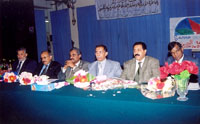
A Grand Celebration of the Cultural Week [Archives:2004/742/Education]
May 31 2004
 |
 |
One of the activities included in this cultural week celebration by the Department was a competition in writing poems. Thirty-five poems were selected and published with minor editing in the form of a mini-book. The Department has had the distinction of being the first in starting so many new academic activities in the past. It was perhaps for the first time, that a University Department of English in Yemen could find as many as thirty-five worthwhile poems by undergraduate students good enough to be anthologized and published in he form of a book. These poems were selected not by people in the Department, but by people of proven ability outside the Department, and these referees were heard saying that each of these thirty-five poems had enough of poetic merit to justify their inclusion in a book. Next year, the Department is planning to have this competition on a national scale.
Another ingenious type of competition, a competition certainly worthwhile but perhaps never organized so far by a Department of language and literature in Yemen, or perhaps anywhere else outside Yemen, was a competition in a perceptive selection of quotable quotes. Students were advised and encouraged to consult all possible dictionaries of quotations, to recollect in tranquility all that they had studied in prose or in verse and to explore extensively all that was available on the Internet, and ultimately to select the quotations that they considered to be the best of all that they had come across. The strategy of the Department was that the student should, during this selection, be exposed to and be enriched by the ideational wealth and variety and also the vigor and elegance of expression in powerful statements made by great geniuses all over the world. The idea of this competition created a great deal of enthusiasm and excitement among students and about one hundred and fifty students took part in the competition. The student who got the first prize in this competition was, interestingly enough, a newly admitted student of level one. The quotable quotes selected by the students were so many and so good that the Department decided to compile and edit them and bring them out in the form of a book. By doing this, the Department added a new feather to its cap. Once again it made itself the first Department of English in Yemen to have started this academic activity. Next year, the Department is planning to organize on a nation-wide scale a competition in selecting worthwhile anecdotes.
The last day of the three-day celebration was the day earmarked for the inter-university debate and recitation. The topic of the debate was “What the world needs today is not nationalism but internationalism.” The audience was amazed, in fact astounded, by the overall standard of performance of the participants, the facts that they had gathered, the cohesive framework in which they presented those facts, the rhetorical flourishes that they used in order to beautify their debate and the vigor with which they presented themselves.
When welcoming the guests and introducing the topic of the debate, the Chairman of the Department, traced the history of debates to the city states in Greece during the pre-Christian era while citizens had to defend themselves and their relatives before a jury consisting sometimes of as many as five hundred members. The modern institution of lawyers, he said, and the modern phenomenon of one-sided debates have their origins in the defense and accusations argued out in those city-states more than two thousand years ago. The West has given us the phenomenon of debates and the institution of lawyers as they have learnt from the ancient philosophers, mystics and visionaries from the East. The East with its philosophical preoccupations was less interested in arguing against others and more interested in the debates and arguments that take palace in the psyche of an individual, particularly against negative and destructive emotions. Kahlil Gibran when echoing this debate in the inner psyche once said, “Oh God, let me have no enemy, but if I have to have an enemy, let his strength be equal to mine so that truth alone is the victor.” The Chairman said that although debates in the East these days are no less interesting than those in the West and particularly in Greece, we must not forget the ancient origin of debate in the world. He expressed the wish that the bright young boys and girls in the East, in Yemen in particular, will give to that ancient tradition a new life, a new vigor and a new healthy personality of its own.
The distinguished personalities who were present on the occasion as guests were Dr Mohammed Muttahar, the Vice-Minister for Higher Education, Dr Saleh Ali Bassura, the President of Sana'a University, Dr Ahmed al-Kipsy, the Vice-president for Academic Affairs, Dr Khalid Tamim, the Vice-president for Student Affairs, Dr Tawfiq Sufiyan, the Vice-president for Postgraduate Studies and Research, Dr Hussein al-Bakry, the Dean of the Faculty of Arts, and Mr. Karuppaiyah, the Indian Ambassador to Yemen. Dr Saleh Ali Bassura, the President of Sana'a University, in his speech praised the efforts of the Department of English in organizing the cultural week and said that the activities included in the cultural week were a welcome addition to the routine teaching in the university.
——
[archive-e:742-v:13-y:2004-d:2004-05-31-p:education]


